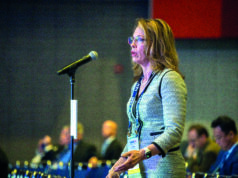
A new cross-sectional analysis as part of the SECOND trial found that most vascular surgery trainees are satisfied with their operative and clinical autonomy but that those who are not had increased odds of professional dissatisfaction, personal life dissatisfaction, burnout, thoughts of attrition and suicidal ideation.
The findings were presented during the 2025 Southern Association for Vascular Surgery (SAVS) annual meeting held in St. Thomas, the U.S. Virgin Islands (Jan. 22–25), by Margaret Reilly, MD, a vascular surgery resident at Northwestern Medicine in Chicago.
The research team sought to address concerns around the graduated autonomy of trainees as training paradigms shift and increasing comorbidities among vascular disease patients. They analyzed trainee perceptions of autonomy and evaluated associations with wellness metrics in a voluntary survey performed after participants took the Vascular Surgery In-Training Exam (VSITE) from 2020–2024.
Autonomy was evaluated around whether trainees have appropriate amounts of time in the operating room and participation in clinical decision making, as well as level of operative autonomy. The survey involved the Likert rating scale, dichotomizing between “disagree” and “agree.”
In assessing learning environment domains, the analysis looked at efficiency and resources, organizational control, mistreatment and faculty engagement.
The primary outcome measure was burnout, with secondary measures including suicidal ideation, thoughts of attrition, professional satisfaction and personal satisfaction.
The analysis did not find any differences in satisfaction of autonomy based on postgraduate year, Reilly reported, “and this was also the case when we grouped trainees based on seniority.”
She continued, “We did find significant differences in gender, where male trainees were more likely to be satisfied with their autonomy as compared to female trainees. And this was also true when comparing community and academic programs, where trainees at community programs were more likely to be satisfied with their autonomy as well.”
Bivariable analysis of learning environment factors and their associations with satisfaction with autonomy revealed significant differences for all learning environment factors, Reilly told SAVS 2025. Among them, the results showed that trainees who felt that their educational time was protected, who felt belonging and cooperation among trainees and support staff, and who felt they had adequate and appropriate attending mentorship were all more likely to be satisfied with their autonomy.
Multivariable logistic regression of predictors of training autonomy showed that satisfaction with faculty engagement was associated with 4.8 times more odds of being satisfied with the level of autonomy, while being satisfied with efficiency and resources in a training program was associated with 10 times more odds of being satisfied.
“We then evaluated wellness metrics and their associations with satisfaction with autonomy,” Reilly said. “We found that trainees who were satisfied with their autonomy were less likely to report suicidal ideation, less likely to report thoughts of attrition, and also less likely to have weekly symptoms of burnout.
“When looking at work-life integration factors, we found that trainees who were satisfied with their autonomy were more likely to be happy with their decision to pursue vascular surgery and with their personal life, and also more likely to be satisfied with their ability to perform personal health maintenance tasks.”
Future analysis of surgical milestones and Entrustable Professional Activities (EPAs) “will ultimately help to contextualize the possible interventions that will help improve trainee perception of autonomy,” Reilly concluded.











